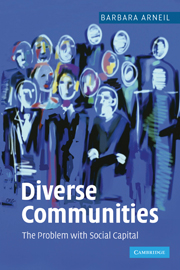Book contents
- Frontmatter
- Contents
- List of abbreviations
- Acknowledgements
- 1 Social capital, justice and diversity: an introduction
- 2 The Progressive Era: past paradise?
- 3 The present malaise in civic participation: empirical and normative dimensions
- 4 The causes of ‘decline’ in social capital theory
- 5 Civic trust and shared norms
- 6 Beyond Bowling Alone: social capital in twenty-first-century America
- 7 Justice in diverse communities: lessons for the future
- References
- Index
1 - Social capital, justice and diversity: an introduction
Published online by Cambridge University Press: 22 September 2009
- Frontmatter
- Contents
- List of abbreviations
- Acknowledgements
- 1 Social capital, justice and diversity: an introduction
- 2 The Progressive Era: past paradise?
- 3 The present malaise in civic participation: empirical and normative dimensions
- 4 The causes of ‘decline’ in social capital theory
- 5 Civic trust and shared norms
- 6 Beyond Bowling Alone: social capital in twenty-first-century America
- 7 Justice in diverse communities: lessons for the future
- References
- Index
Summary
‘Social capital’ is a term used by Robert Putnam in his best-selling book Bowling Alone: The Collapse and Revival of American Community (2000). It is a clarion call for a renewed civic engagement in the Western industrialized world, most particularly the United States of America. The social capital thesis has proven to be extraordinarily powerful, spawning a veritable industry of research that analyses every facet of social capital in America and beyond. Its impact has been felt from the highest of political offices through academic circles and local community organizations to average American citizens.
Social capital, as a concept, has had such a profound impact in such a short time for several reasons. First, it represents an important shift in focus, within Western political theory, away from either the state or citizen to the civic space in between. In this regard, the social capital thesis parallels two influential schools of thought within contemporary liberal democratic theory, namely communitarianism and ‘third way’ theory. In both cases, civic space or community is the starting point of analysis, rather than either the rights-bearing citizen of liberalism or the equality-bearing state of socialism or social democracy. This theoretical shift is relatively young, but the potential significance is profound. In essence, a new theoretical paradigm that seeks to transcend the left/right divide through an emphasis on the space in between the individual and the state is challenging the two great ideologies of the modern era, liberalism and socialism.
- Type
- Chapter
- Information
- Diverse CommunitiesThe Problem with Social Capital, pp. 1 - 14Publisher: Cambridge University PressPrint publication year: 2006



